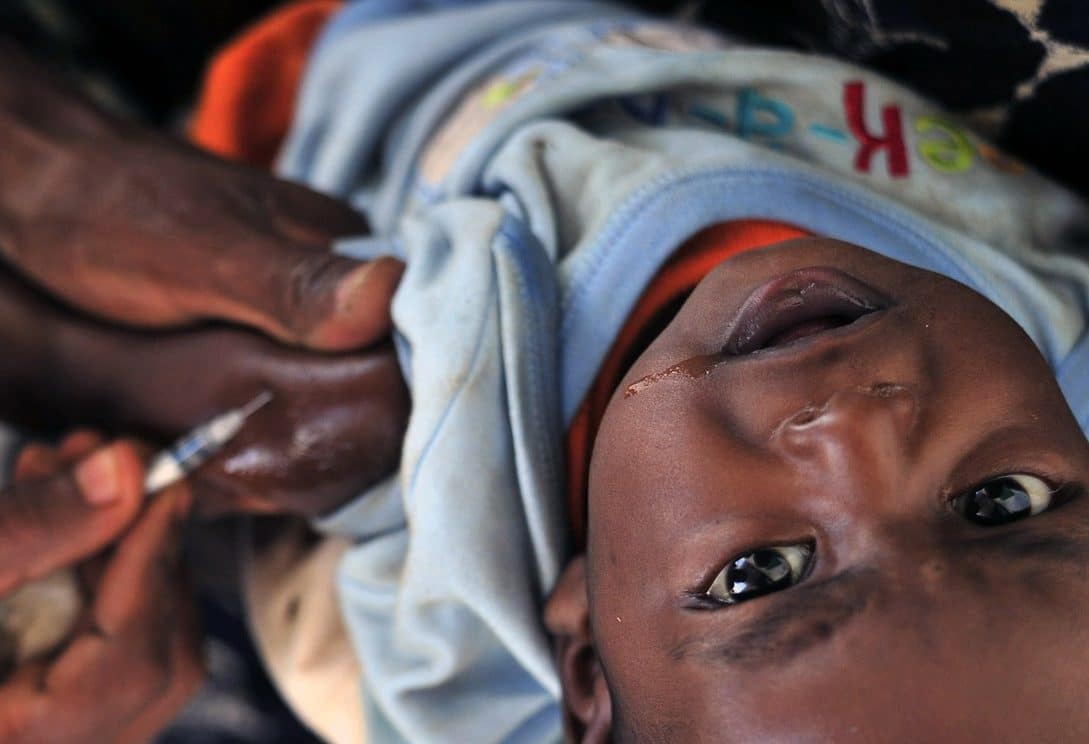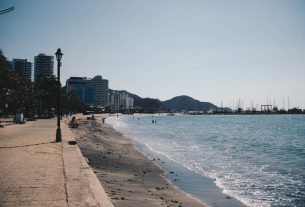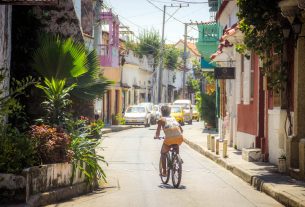Bring healthcare to people in need of medical and humanitarian aid in the midst of armed conflicts, epidemics, natural disasters, malnutrition and exclusion from access to healthcare. This is the objective of Doctors Without Borders, an international humanitarian organization created in France in 1971.
“For me, a doctor and a woman, working in places of humanitarian crises is very difficult. As for any other human being who has a little empathy for others. I don’t think that because I’m a doctor I see this differently than anyone else who works in humanitarian crises.”
Around the world, there are more than 45 thousand professionals from different areas and nationalities and our character today is one of these people. We spoke with Minas Gerais pediatrician Junia Cajazeiro, a doctor who graduated in 2012 from UFMG and who joined MSF in 2016.
“During medical school I saw a lecture by a surgeon who worked for MSF and I identified with the institution: providing quality medical care to the most vulnerable. So, since that lecture, which was at the very beginning of college, I had decided that I would work with the institution”, says Junia.
Right after the meeting, she ran to the website to see what was needed to join the organization: speak a second language fluently, have two years of experience in the field and identify with the project. And that’s how, since college, she started working hard to get her prerequisites.
“When we enter the institution as people who go to work in another country, we go into coordination positions – so I went to Uzbekistan to coordinate the medical team that treated children with tuberculosis in the Karakalpakstan region. In Ethiopia, I worked in three different locations and in each of them I coordinated a different team for a specific job: infirmary, emergency room, maternity ward (part of neonatology) and malnutrition treatment. Here in Brazil, I went as a pediatrician to start providing medical care at the health center where we were working together with the SUS team.”
With Doctors Without Borders, Junia has already worked in Uzbekistan, Tajikistan, Ethiopia, Iraq and Roraima, here in Brazil. Anyone who wants to know Junia’s missions can access her MSF page and read the reports.
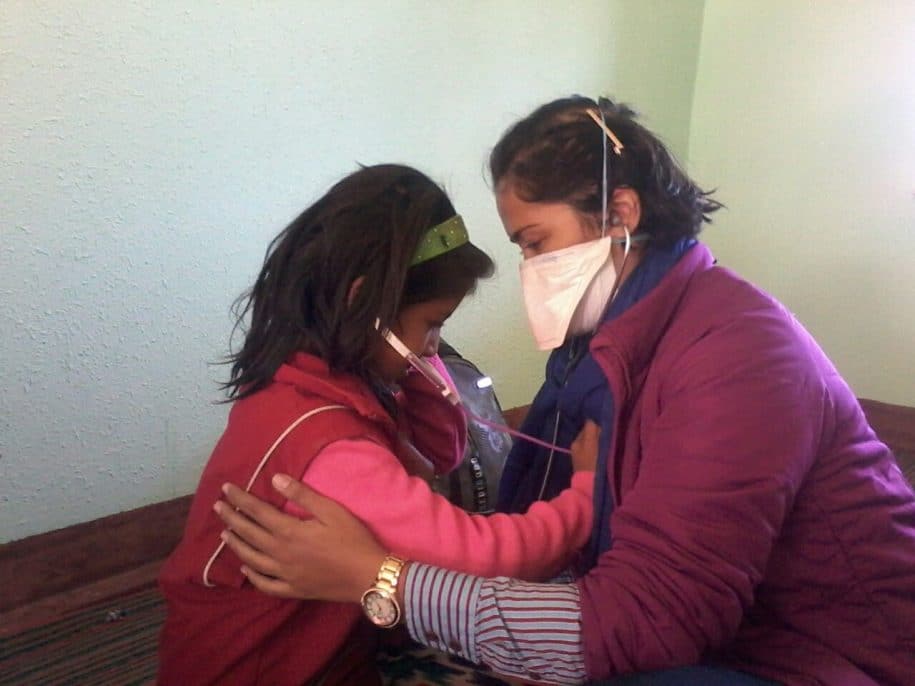
The pediatrician says that, in the places where she was, each one had their own difficulties and needs. For her, it is even difficult to pinpoint the biggest challenge, as it depends on how the problem is seen.
She says that her heart would hurt after certain events – and that wasn’t necessarily a problem for the community. And other things that hurt the residents, sometimes she didn’t understand very well, until someone explained why it was important for the population.
“I have worked with populations with a lack of access to food, populations that returned to their homes after a war and found their entire city destroyed, with no possibility of reconstruction. I’ve worked with refugee populations. Each of them has their own pain and I don’t know how to measure that pain in any way.”
Independent, neutral and impartial. It is MSF who determines, according to its own assessment, where, when and how to act.
In case of sudden emergencies, action can be initiated within 48 to 72 hours. This is because, over the years and with the experience gained in various actions, they managed to develop and improve an extremely efficient logistics system.
Since 1980, the organization has started using personalized kits adapted for each context, which are pre-packaged and ready to travel and constantly improved. The kits contain medicines, supplies and basic equipment and range from vaccination campaigns to setting up an inflatable hospital. This makes it easier to act in cases of natural disasters, for example.
See the table below for MSF numbers in 2018.
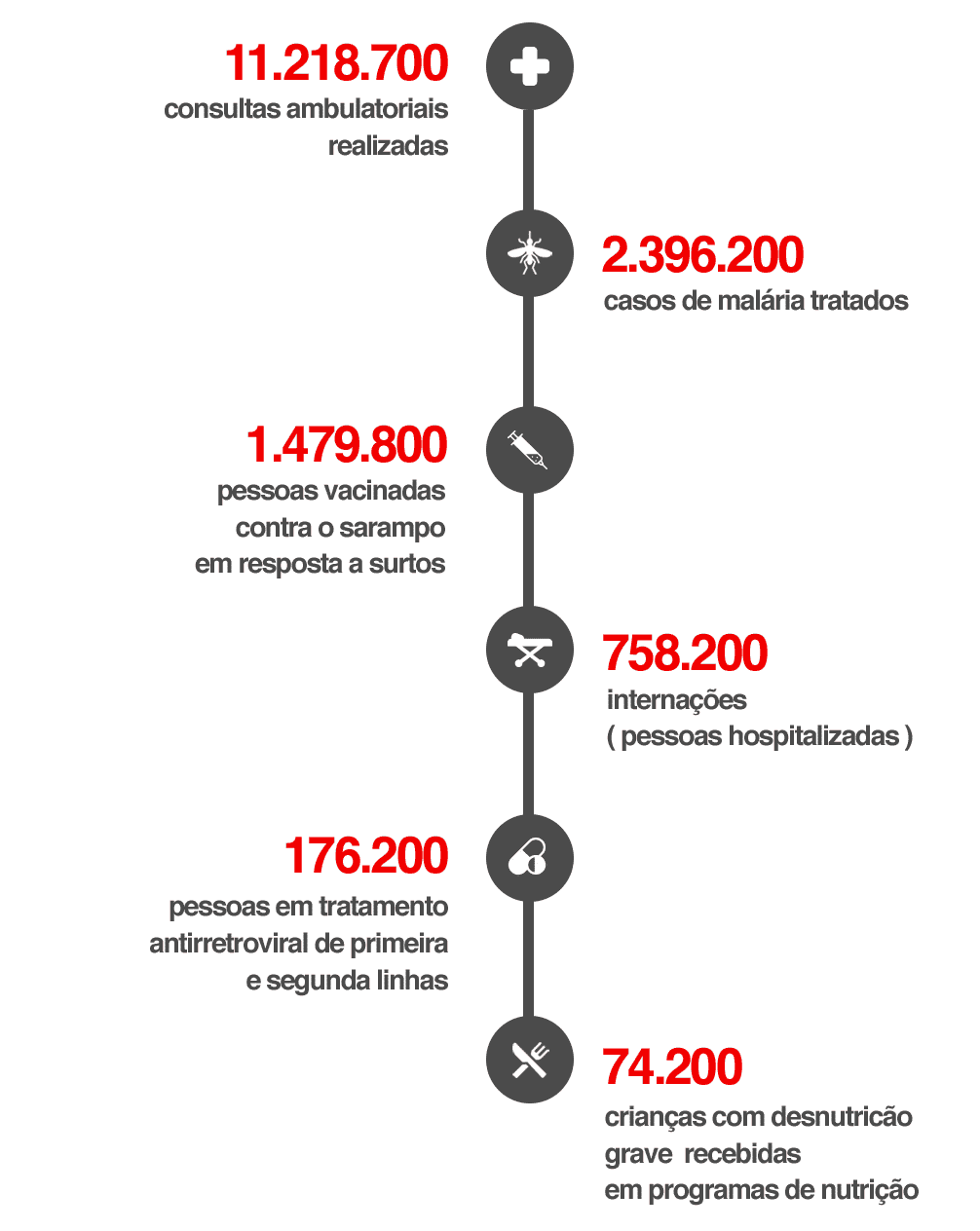
The humanitarian work of Doctors Without Borders
“Humanitarian medical work is heavy, it requires us to spend long hours, a lot of study, reinventing a lot of things to adapt to the reality of the place we are in. Many people, when they find out that I’m part of Doctors Without Borders, say: ‘Wow, how cool! You must have seen a lot of cool things, right?’
Yes, I certainly saw other cultures, I met wonderful people, I started working in hospitals, but I wouldn’t consider that as something cool. Humanitarian work puts us face to face with a lot of sadness, a lot of misery. There is no glamor in this. There is a lot of companionship with those who work with you, a lot of laughter, because mental health is essential to manage everything, but it is not easy”, says Júnia.
The work of Doctors Without Borders is, above all, medical.
The organization provides assistance and preventive care to those in need, regardless of the country where they are. Their work is present in more than 70 countries, bringing help to those who need it and do not have adequate access.
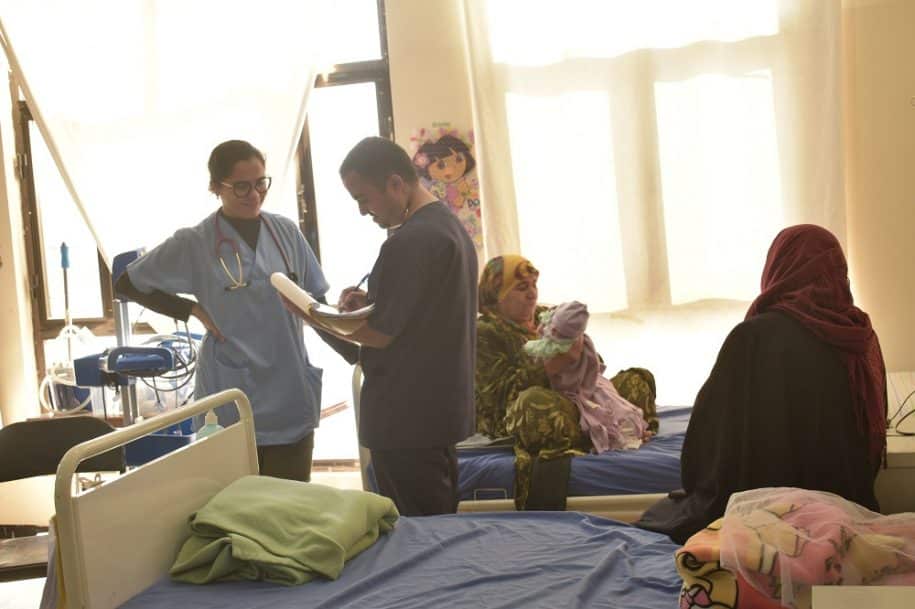
The humanitarian work carried out by MSF was awarded the Nobel Peace Prize in 1999.
Júnia says that humanitarian work requires a lot of dedication and also giving up certain things, such as spending time with family and friends. Sometimes, the medical team has to stay in places that are difficult to access, where different types of food cannot be reached and there may even be restrictions on movement.
“Many of you are in regions where there is a danger of moving from one place to another (because of bombs, kidnappings, shootings, etc.). We reinvent ourselves, rediscover ourselves and change a lot, a lot.”
Humanitarian work x tourism
For Júnia, there is a big difference between humanitarian work and humanitarian tourism. Humanitarian work requires time, engagement with the local community and understanding the needs of those people.
“It means trying to understand how that population sees their needs and what they need and not simply seeing with our eyes what needs they ‘should’ have and giving them what we consider necessary.
Humanitarian work requires empathy and, as they say in English, ‘walking in other people’s shoes’. And doing this requires an anthropological understanding, it demands listening. Typically, humanitarian work requires a local team, which is the most important thing. The projects are sustainable in that community and there is respect for local culture and local needs”.
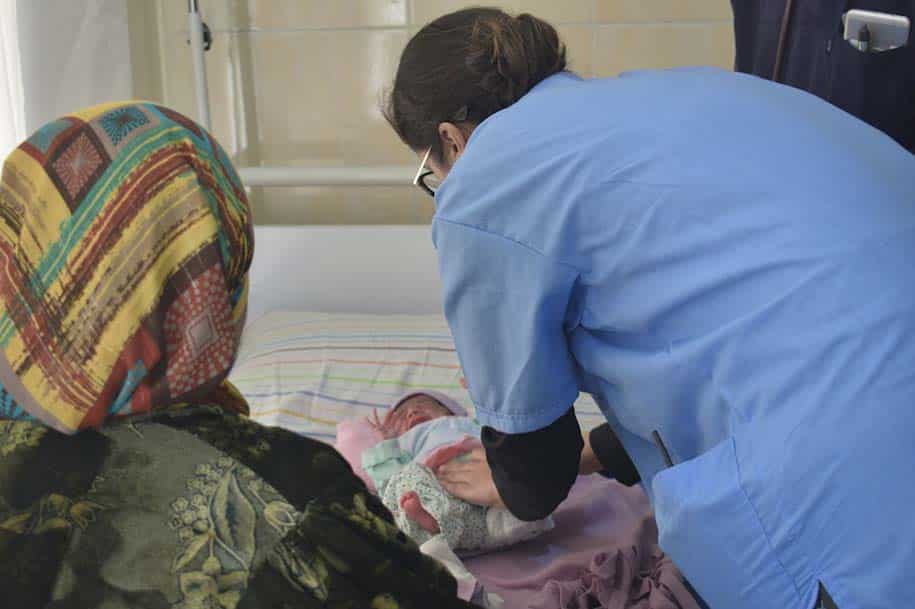
“There are several institutions that provide help to communities, in the way they see that population needs, in the time they can give (weeks, perhaps), but there is no maintenance of that project.
These welfare aids, in my point of view, are nothing more than humanitarian tourism, in which the person takes the help they deem necessary, for a short time, takes photos, boasts, returns with the feeling of duty accomplished, but There is, in fact, no help for that community, which after the visit returns to the parameters it had before, with no possibility of improving its quality of life, a real chance of leaving the reality in which it lives”.
According to the doctor, there are several serious humanitarian work institutions and there are serious websites that show the difference between humanitarian tourism and humanitarian aid.
“Are you going to have trips to tourist sites in your ‘package’ while helping that population? So it is humanitarian tourism. Are you going to stay for a short time, working in a nursing home? Still tourism… Do volunteer work at the nursing home in your city!”
Doctors Without Borders and Covid-19 in Brazil
MSF has been in Brazil since 1991. Currently, the organization sends 190 Brazilians from different specialties to projects around the world. In times of pandemic, they have intensified the areas of activity in Brazil.
According to the organization, MSF’s response to COVID-19 focuses on three pillars: supporting health authorities in providing care to COVID-19 patients; protect vulnerable and at-risk people; and keep essential medical services running.
They have taken even greater care with team professionals, to prevent facilities from spreading the virus or being forced to close their doors.
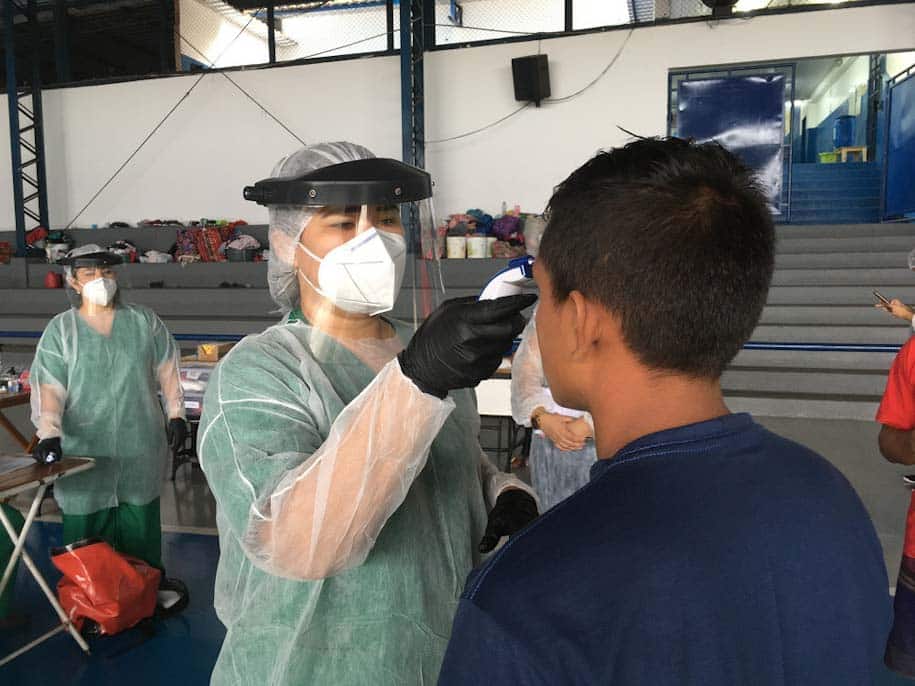 Photo: Gabriela Romero- Doctors Without Borders
Photo: Gabriela Romero- Doctors Without Borders
In Amazonas, MSF began operating in the state capital on April 25th. Since then, they have opened an isolation and observation center for patients from vulnerable groups with milder cases of the disease, who do not require hospitalization. They also carried out activities within the state to organize the provision of quality medical care for patients with moderate and severe cases of COVID-19 in remote areas.
Anyone who wants to take a closer look can see the actions on the MSF website. Júnia is there, coordinating the outreach team.
In São Paulo, one of the organization’s biggest concerns is with the homeless population, migrants, indigenous people, drug users and elderly people who live in nursing homes.
In the Brazilian city that has the largest number of cases, they seek to expand health education activities, active case search and referral of identified patients to treatment centers. The city has an estimated homeless population of 24 thousand people.
If you want to see how the follow-up has been, just check out the MSF page.
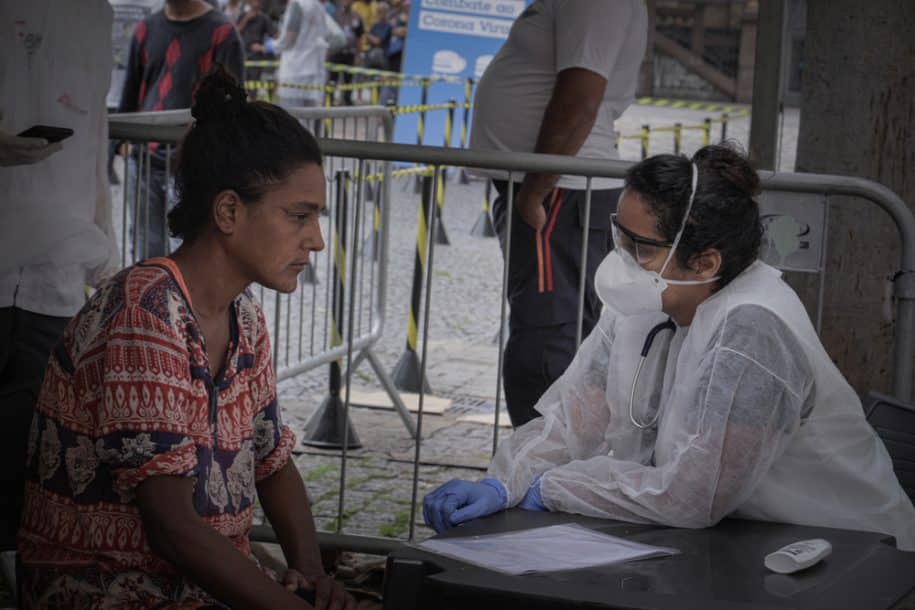
Photo: Andre Francois/ Doctors without borders
Doctors Without Borders: how to donate
“MSF is an NGO and our income is made exclusively from donations from individuals, just like you and me. We do not receive donations from governments or institutions such as pharmaceutical industries, precisely to maintain our neutrality and impartiality in any environment. So, donation is an essential part of our survival. Donors are vital for MSF to continue to exist and do its work.”
If you want to donate, just go to the MSF DONATIONS area and register.
Did you like the project and want to know more? Keep an eye on Doctors Without Borders’ social media:
• Site
• YouTube
The Voices
Vozes is a special newsletter, sent every fortnight, where we tell stories of extraordinary people and projects, who use the world of travel to transform the world. From time to time the content is published here on the blog too, but if you always want to receive the texts, and first hand, subscribe to our newsletter. It’s free and you also get an ebook full of tips for planning your first trip abroad.
If you want to follow what we’ve already done:
Sign up for our newsletter

Sign up for our newsletter and stay up to date with exclusive news
that can transform your routine!
Warning: Undefined array key "title" in /home/storelat/public_html/wp-content/plugins/link-whisper-premium/templates/frontend/related-posts.php on line 12
Warning: Undefined array key "title_tag" in /home/storelat/public_html/wp-content/plugins/link-whisper-premium/templates/frontend/related-posts.php on line 13

